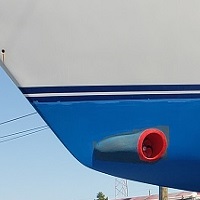ABOUT ELECTRIC BOATS
What's in an engine? Reliability may be the most critical factor. This is not a usual mindset for a sailor, after all we have a backup power plant aoft, but I view reliability in two dimensions: The first is in maneuver, the other is in long range, say, 300 to 400 nm distance if emergencies take place. Anything else is simply a tradeoff for time at slow speed.
Why not Diesel Electric?
Of course, many ships are Diesel electric, and there is reason for this as well. Their daily operating costs are vastly dependent on fuel consumption, and engines operate best at and operating point that is a significant percentage of the max power.
Engines also operate more efficiently at some torque levels. Using an electric alternator to vary the load on the engine, then convert that load back to electricity is an old technique to match demand ( based on propeller speed, sea state, etc) to the best performance point of the engine, and this is best done with more than one engine: At SubCom, where I worked, five locomotive Rolls Royce engines would operate as variable power plant, and more demand meant more engines placed in service for a given operation. The diesel to alternator to DC to AC to electric motor chain inefficiencies are offset by fuel savings. In summary, for many years the ship industry has offered Diesel Electric systems.
For a small yacht, a Diesel electric system, to achieve any kind of efficiency gain, would have to have two or more generators to get full benefit. You would get partial benefit of course but limited. Such efficiency example is well known to Catamaran owners, who keep a single engine on when long distance passagemaking in light winds. WIth a diesel electric approach, you can get even better efficiency. The total cost of ownership, maintaining extra equipment, initial costs of power electronics and motors, today is a cost burden. I am not sure if it is a carbon net gain, but it might be.
Why not Electric?
There is a misconception of electric propulsion systems capability for small yachts on the market. Solid engineering is being made by many reputable firms, but on the demand side, few people understand all the implication of such systems - or their cost. So most people will tell you that their boat, which does not acahieve a long range, will perform fine for their needs, and their electric motor connected to the house bank wit some drive control electronics is achieving the range needed. Some are delusional about the range achieved. Others, typically with some technical understanding, will tell you the truth: THe range is limited, the use needs to be short term, and you will rely on sails for most of everything. That is ok, in my opinion, but what I object most to is the excitement about the fad without doing the math. I am proposing high level numbers here.
My view is that if you want range, you need liquid fuels, not batteries. you cannot eliminate Diesel Fuel if you have a need for distant passages that may have days of motoring. Never mind "it's a sailboat, meant to sail". SUre, but you can run out of food in the Doldrums too. Energy storage becomes the key problem with pure electric systems. Every thing else a a positive. Quiet, vibration free operation, and light weight, may be even the ability for power generation under sail. If only we could store more energy per liter and per Kilogram, we woul be golden.
Physics is an indifferent arbitrator for new solutions. It limits chemical reaction energy, and you can only get so much out of a system. Amazing strides have been made, but here is the problem: Diesel energy is about 10 KW-Hour per liter, but only 30 percent can be harnessed for propulsion in a typical engine. Effectively, 3 KW-hour per liter is available to move the boat forward. On the other hand, the lithium battery, has 0.1 kWH of energy per Kg of weight. Fuel weighs 0.8 Kg/liter. This means that the energy density by weight of lithium batteries requires 40 times the weight of the fuel tank you enjoy. That is why diesel electric has merit.
I would certainly not exclude battery powered boats on small lakes, for ferries, given fast charging lithium batteries using new anode technologies coming to the market, this can make sense for soe use scenarios. But it is telling to look at the latest technology of catamarans, the Sunreef 80 touted as an all electric unlimited range voyager, and it pretty much is. Little glitch: Two 160 kW generators and 8600 liters of fuel are aboard this sailboat. You have to replenish the 1 Megawatt hour, million plus dollar battery after all, and 45 Kilowatts of solar won't do the trick. Example of a Diesel ELectric High end Catamaran : SUNREEF 50 brochure

